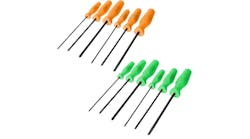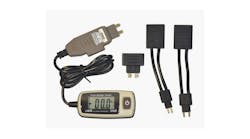Due to the extensive impact tire pressure has on vehicle safety and efficiency, tire pressure monitoring sensors are required on all cars sold in the U.S. after Sept. 1, 2007. NSF International has launched the first and only certification program specifying safety and quality requirements for automotive in wheel tire pressure monitoring sensors for the aftermarkets parts industry.
U.S. Congress passed the Transportation Recall Enhancement Accountability and Documentation (TREAD) Act in 2000 in response to a defective tire recall that resulted in unsafe driving conditions and fatalities. The Act mandates the use of a tire pressure monitoring systems technology in all light motor vehicles (under 10,000 pounds) to alert drivers about underinflated tires.
Consistent with this Act, NSF International’s Tire Pressure Monitoring Certification Program requires independent review and testing against original equipment (OE) service parts to ensure the highest level of performance from NSF Certified sensors. Additionally, NSF International audits the manufacturing facilities and quality systems to ensure that they meet or exceed NSF’s stringent protocol requirements for the manufacture of automotive tire pressure monitoring sensors. To maintain certification, manufacturers of NSF Certified tire pressure monitoring system sensors will undergo quarterly facility audits and in-market parts testing to validate the quality and integrity of the NSF Certified sensors.
Engineers, regulators, manufacturers and industry associations developed the NSF Tire Pressure Monitoring Certification Program to respond to growing concerns that ineffective tire monitoring sensors are being installed in vehicles. The following companies helped developed the protocol in which the certification program is based: the Automotive Maintenance and Repair Association, Belle Tire, ATEQ, the Tire Industry Association, Tiremetrix, LLC, Orange Electronics, F3 Labs and NSF International. The program fills a void as certification for tire pressure sensors was not available until now.
The new NSF Tire Pressure Monitoring Certification Program complements the NSF Automotive Collision Replacement Parts Certification Program. Since the NSF auto parts program was launched in 2010, it has tested and certified thousands of lamps, fenders, sheet metal components, steel bumpers, bumper fascias, step bumpers, brackets, reinforcement bars (rebars), plastic components and absorbers verifying compliance with rigid quality, safety and performance standards.
According to Bob Frayer, Director of NSF International’s Automotive Collision Certification Programs and Engineering Laboratories, “Similar to the NSF Automotive Collision Replacement Parts Certification Program, NSF International’s new Tire Pressure Monitoring Certification will help meet the needs of companies manufacturing tire pressure monitoring sensors, regulators who strive to keep drivers safe on the road and consumers who want reliable tire pressure monitoring systems.”
In a recent independent survey conducted on behalf of NSF, a significant number of consumers affirmed that the quality and safety of automobiles are major concerns. Manufacturers of auto parts are responding by choosing to pursue NSF Certification as proof of the quality of their parts, and more bodyshops and distributors continue to choose NSF Certified automotive parts.
All tire pressure sensors that meet NSF International's certification requirements will be listed on NSF’s website and are authorized to bear the NSF Certification Mark.
Subscribe to Motor Age and receive articles like this every month…absolutely free. Click here

